10 start with I start with I
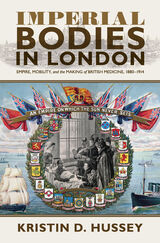
Winner, 2022 Whitfield Prize for First Monograph in the Field of British and Irish History
Since the eighteenth century, European administrators and officers, military men, soldiers, missionaries, doctors, wives, and servants moved back and forth between Britain and its growing imperial territories. The introduction of steam-powered vessels, and deep-docks to accommodate them at London ports, significantly reduced travel time for colonists and imperial servants traveling home to see their families, enjoy a period of study leave, or recuperate from the tropical climate. With their minds enervated by the sun, livers disrupted by the heat, and blood teeming with parasites, these patients brought the empire home and, in doing so, transformed medicine in Britain. With Imperial Bodies in London, Kristin D. Hussey offers a postcolonial history of medicine in London. Following mobile tropical bodies, her book challenges the idea of a uniquely domestic medical practice, arguing instead that British medicine was imperial medicine in the late Victorian era. Using the analytic tools of geography, she interrogates sites of encounter across the imperial metropolis to explore how medical research and practice were transformed and remade at the crossroads of empire.

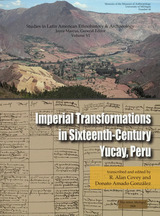

Radhika Mohanram shows not just how British imperial culture shaped the colonies, but how the imperial rule of colonies shifted—and gave new meanings to—what it meant to be British.
Imperial White looks at literary, social, and cultural texts on the racialization of the British body and investigates British whiteness in the colonies to address such questions as: How was the whiteness in Britishness constructed by the presence of Empire? How was whiteness incorporated into the idea of masculinity? Does heterosexuality have a color? And does domestic race differ from colonial race? In addition to these inquiries on the issues of race, class, and sexuality, Mohanram effectively applies the methods of whiteness studies to British imperial material culture to critically racialize the relationship between the metropole and the peripheral colonies.
Considering whether whiteness, like theory, can travel, Mohanram also provides a new perspective on white diaspora, a phenomenon of the nineteenth century that has been largely absent in diaspora studies, ultimately rereading—and rethinking—British imperial whiteness.
Radhika Mohanram teaches postcolonial cultural studies in the School of English, Communication and Philosophy at Cardiff University, Wales. She is the author of Black Body: Women, Colonialism, Space (Minnesota, 1999) and edits the journal Social Semiotics.
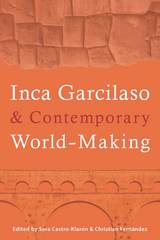
This collection offers five classical studies of Royal Commentaries previously unavailable in English, along with seven new essays that cover topics including Andean memory, historiography, translation, philosophy, trauma, and ethnic identity. This cross-disciplinary volume will be of interest to students and scholars of Latin American history, culture, comparative literature, subaltern studies, and works in translation.
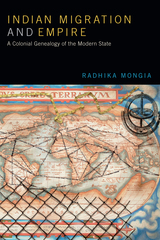
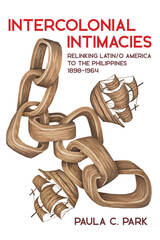
As a nation, the Philippines has a colonial history with both Spain and the United States. Its links to the Americas are longstanding and complex. Intercolonial Intimacies interrogates the legacy of the Spanish Empire and the cultural hegemony of the United States by analyzing the work of twentieth-century Filipino and Latin/o American writers and diplomats who often read one other and imagined themselves as kin. The relationships between the Philippines and the former colonies of the Spanish Empire in the Americas were strengthened throughout the twentieth century by the consolidation of a discourse of shared, even familiar, identity. This distinct inherited intercolonial bond was already disengaged from their former colonizer and further used to defy new forms of colonialism. By examining the parallels and points of contact between these Filipino and Latin American writers, Paula C. Park elaborates on the “intercolonial intimacies” that shape a transpacific understanding of coloniality and latinidad.
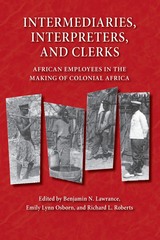
By uncovering the role of such men (and a few women) in the construction, function, and legal apparatus of colonial states, the essays in this volume highlight a new perspective. They offer important insights on hegemony, collaboration, and resistance, structures and changes in colonial rule, the role of language and education, the production of knowledge and expertise in colonial settings, and the impact of colonization in dividing African societies by gender, race, status, and class.
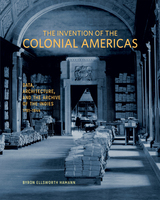
The Invention of the Colonial Americas is an architectural history and media-archaeological study of changing theories and practices of government archives in Enlightenment Spain. It centers on an archive created in Seville for storing Spain’s pre-1760 documents about the New World. To fill this new archive, older archives elsewhere in Spain—spaces in which records about American history were stored together with records about European history—were dismembered. The Archive of the Indies thus constructed a scholarly apparatus that made it easier to imagine the history of the Americas as independent from the history of Europe, and vice versa.
In this meticulously researched book, Byron Ellsworth Hamann explores how building layouts, systems of storage, and the arrangement of documents were designed to foster the creation of new knowledge. He draws on a rich collection of eighteenth-century architectural plans, descriptions, models, document catalogs, and surviving buildings to present a literal, materially precise account of archives as assemblages of spaces, humans, and data—assemblages that were understood circa 1800 as capable of actively generating scholarly innovation.

Veracini challenges two important myths: firstly, that the Israeli-Palestinian dispute is unique and defies comparative approaches; and secondly that the struggle is mainly based in nationality and religion and therefore different to typical colonial conflicts. On the contrary, Veracini shows how Israeli society is organised along apartheid lines -- and that apartheid was not unique to South Africa, but a common feature of colonisation. He examines wars of decolonization, and conflicts where whole native populations were all but eradicated -- as in Australia. Comparing and contrasting these with the more recent history of Israel and Palestine, he offers a critical perspective on colonialism as well as important new insights into patterns of imperialism today.
READERS
Browse our collection.
PUBLISHERS
See BiblioVault's publisher services.
STUDENT SERVICES
Files for college accessibility offices.
UChicago Accessibility Resources
home | accessibility | search | about | contact us
BiblioVault ® 2001 - 2024
The University of Chicago Press









